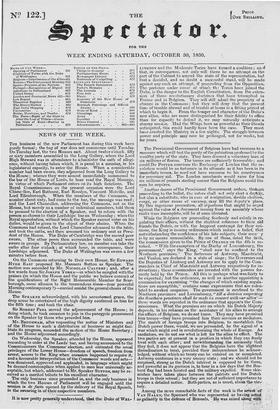NEWS OF THE WEEK.
TEE business of the new Parliament has during this week been purely formal ; the tug of war does not commence until Tuesday. On Tuesday last, the two Houses met. About twelve o'clock. fifty or sixty members assembled in the Long Gallery, where the Lord High Steward was in attendance to administer the oath of allegi- ence, without having taken which, it is penal in a memb% in his legislatorial capacity, to enter the House. When a considerable Amber had been sworn, they adjourned from the Long Gallery to the House ; whence they were almost immediately summoned to the bar of the House of Lord's, to hear read the Royal Message, in virtue of which Parliament enters on its high functions. The Royal Commissioners on the present occasion were the Lord Chancellor, Earl Bathurst, Earl Rosslyn, Viscount Melville, and Lord Ellenborough. When the members of the Commons, in number-about sixty, had come to the bar, the message was read ; and the Lord Chancellor, addressing the CoMmons, not as the House, but merely as a number of individual members, told them to proceed to the election of a Speaker, and to return with the person so chosen to their Lordships' bar on Wednesday ; when the Royal approbaf ion, witholit which the Speaker cannot enter on his duties, would be given to the object of their choice. When the Commons had retired, the Lord Chancellor advanced to the table, and took the oaths, and then assumed his ordinary seat as Presi- dent of the House. The Duke of Cambridge was the second peer sworn. The. other peers then surrounded the table, and were sworn in groups. By Parliamentary law, no member can take the oaths after four o'clock ; at which hour, in consequence, their Lordships adjourned. The Duke of Wellington was sworn a few minutes before four.
On the Commons returning to their own House, Sir EDWARD HYDE EAST proposed Mr. Manners Sutton as Speaker: The motion was seconded by Mr. NICHOLAS CALVERT ; and, after a few words from Sir JOSEPH YORKE—in which he mingled with the praises (in which the House and the public we believe concur) of the qualifications of the Right Honourable Member for Scar- borough, some allusion to the tremendous times—(our powerful Morning contemporary ?)—carried amidst the general cheers of the House.
The SPEAKER acknowledged, with his accustomed grace, the deep sense he entertained of the high dignity conferred on him for the fifth time ; and took the chair.
Sir ROBERT PEEL moved the adjournment of the House ; in doing which, he took occasion to join in the panegyric pronounced on the Speaker by those who preceded him.
Mr. BROUGHAM, after requesting the notice of Ministers and of the House to such' a distribution of business as might faci- litate its progress, seconded the motion of the Home Secretary ; and the House adjourned accordingly.
On Wednesday, the Speaker, attended by the House, appeared according to order at the Lords' bar, and having announced to the Commissioners the Commons' election, and entreated the usual privileges of the Lower House—freedom of speech, 'freedom from arrest, access to the King. when occasion happened to require it; and a favourable interpretation of the Commons' words and acts— was dismissed, approved and applauded, in language which might be deemed commonplace when applied to men less universally acL ceptable, but which, addressed to Mr. Speaker SUTTON, may be re- ceived as a merited tribute to his excellent character.
The only business since proceeded in, and the only business in which the two Houses of Parliament will be engaged until the session is de facto opened by the delivery of the Royal Speech, is the swearing in oftheir respective members.


























